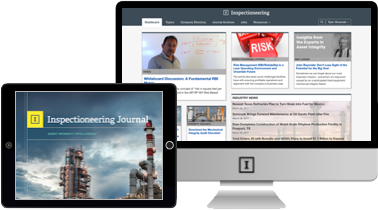-
The American Petroleum Institute (API) is a trade organization that represents the oil and gas industry in the United States. Since 1924, API has been the leader in developing equipment and operating standards for the oil and natural gas industry. API works with...
-
API 510, Pressure Vessel Inspection Code: In-Service Inspection, Rating, Repair, and Alteration, is an inspection code developed and published by...
-
API 570, Piping Inspection Code: In-Service Inspection, Repair, and Alteration of Piping Systems, is an inspection code developed and published by the American...
-
API 653, Tank Inspection, Repair, Alteration, and Reconstruction, is a standard developed and published by the American Petroleum Institute (API) and covers the inspection, repair, alteration, and reconstruction of...
-
Individual Certification Programs (ICP) have been offered by the American Petroleum Institute (API) since 1989 as a way to test the knowledge and document the experience of inspection...
-
API RP 571, Damage Mechanisms Affecting Fixed Equipment in the Refining Industry, is a recommended practice developed and published by the American Petroleum Institute (API) that provides an in-depth look at nearly 70 different
-
API RP 572, Inspection of Pressure Vessels is a recommended practice developed and published by the American Petroleum Institute (API) that covers the inspection of
-
API RP 573, Inspection of Fired Boilers and Heaters, is a recommended practice published and developed by the American Petroleum Institute (API) that covers the inspection practices for...
-
API RP 574, Inspection Practices for Piping System Components, is a recommended practice developed and published by the American Petroleum Institute (API) that discusses inspection...
-
API RP 575, Inspection Practices for Atmospheric and Low Pressure Storage Tanks, is a recommended practice developed and published by the American Petroleum Institute (API) that covers...
-
API RP 576, Inspection of Pressure-Relieving Devices, is a recommended practice developed and published by the American Petroleum Institute (API) that describes inspection and repair...
-
API RP 577, Welding Processes, Inspection, and Metallurgy, is a recommended practice developed and published by the American Petroleum Institute (API) that provides guidance to...
-
API RP 578, Material Verification for New and Existing Alloy Piping, is a recommended practice developed and published by the American Petroleum Institute (API) that provides the...
-
API RP 580, Risk-Based Inspection, is a recommended practice developed and published by the American Petroleum Institute (API)...
-
API RP 581, Risk-Based Inspection Technology, is a recommended practice developed and published by the American Petroleum Institute
-
API RP 582, Welding Guidelines for the Chemical, Oil, and Gas Industries is a recommended practice developed and published by the American Petroleum Institute (API) that provides supplementary guidelines and practices for welding and...
-
API RP 583, Corrosion Under Insulation and Fireproofing, covers the design, maintenance, inspection and mitigation practices for pressure equipment, piping, and storage tanks due...
-
API RP 584, Integrity Operating Windows, is a recommended practice developed and published by the American...
-
API RP 585, Pressure Equipment Integrity Incident Investigation, is a recommended practice developed and published by the American Petroleum Institute (API) that provides owner-operators...
-
API RP 588, Recommended Practice for Source Inspection and Quality Surveillance of Fixed Equipment is a recommended practice developed and published by the American Petroleum Institute (API) that provides the basic body of knowledge for...
-
API RP 941, Steels for Hydrogen Service at Elevated Temperatures and Pressures in Petroleum Refineries and Petrochemical Plants, is a recommended practice developed and published by...
-
API RP 970, Corrosion Control Documents, is a recommended practice developed and published by the American Petroleum Institute (API) to provide users with the basic elements for...

















Comments and Discussion
Add a Comment
Please log in or register to participate in comments and discussions.